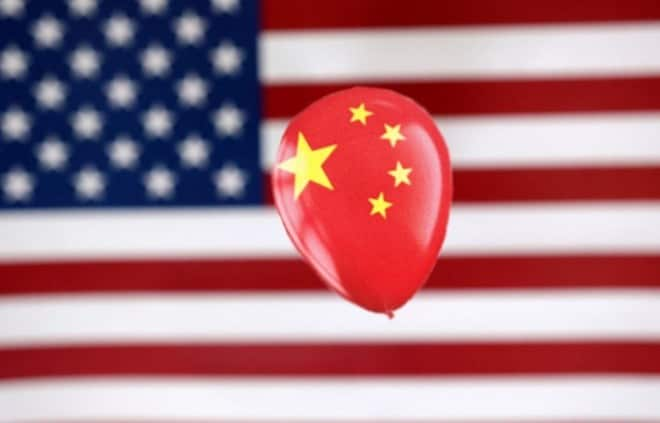In a column titled "China on the Eve of a Major Battle" Timofei Bordachev, the program director of the Valdai Discussion Club think tank, claimed that the clash between China and the U.S. was now inevitable. What was taking place was merely maneuvering as both sides sought positions of maximum advantage. According to Bordachev, there is no chance for reconciliation between the sides, and the balloon incident highlighted Chinese determination to take on the Americans.
Movement towards such a confrontation would please the Russian authorities, since they have been hoping for a more active Chinese involvement in assisting Russia during its current conflict with the West. However, Bordachev explains, as much as Russia would like to see a prompt Chinese response, its timing would be exclusively China's decision, given that Russia has no way of hastening it.
Bordachev's column follows below:[1]

(Image:Zavtra.ru)
It would be erroneous to believe that the Chinese authorities' delay in counterattacking the U.S. should be interpreted as a demonstration of their weakness. The only question is when and under what conditions the Celestial Empire will be ready to challenge the Americans decisively. Both players in the second most important confrontation on the planet are now heading towards a showdown with each other on parallel tracks and are only thinking of initiating action under the most advantageous circumstances for themselves.
In this sense, the U.S.-China relations are more akin to the classic preparations for a great power confrontation: any peacekeeping action means only another postponement of war in order to take up more advantageous positions. Every summit or official talks only makes sense in the context of the inevitable collision.
The foreign policy of both Beijing and Washington resembles the movements of two armies on the eve of a major battle. The commanders know that they will meet each other in battle, but they maneuver, they want their position to be on a hilltop while the enemy's is in the valley, they observe the sun's position waiting for it to blind the enemy. They wait for the most favorable wind in international politics.
Compromise between the two nations is impossible, as both China and the U.S. have already passed this stage of relations a decade ago. But more recently, before the COVID-19 pandemic, their confrontation was static, with both powers biding their time and unprepared for a fight. Such is the nature and substance of their relationship.
Things have changed in the last two or three years: the forces of the two countries are now on the move and the countdown [to conflict] has begun. We cannot say how long this maneuvering will last. And most importantly, it is impossible to predict now when the first shot will be fired by one of the sides. Russia knows from its own experience how difficult it is to see the fine line between "still premature" and "too late" in matters of war and peace.
SUPPORT OUR WORK

The only thing that would not be entirely naive to expect is understanding where the invisible boundary is, beyond which one side would be forced to open fire, or what combination of offensive capabilities would seem to Washington or Beijing sufficient to initiate decisive action. There is no doubt, however, that the "all-clear" signal will not be sounded.
The most likely cause of direct conflict is, naturally, the island of Taiwan. It is a Chinese sovereign territory, administered by an independent government, which the U.S. has pledged to defend with all its available forces. Washington is bullying China in every possible way and has shown a willingness to create risky situations.
Beijing is more restrained, building up its strength and making observers sigh in disappointment when another U.S. provocation receives only threatening statements in response. Quite recently, in August of 2022, we all witnessed Beijing's restrained response to a provocative visit to Taiwan by the U.S. Speaker of the House [Nancy Pelosi].
This is why every decisive move by China is perceived by us as a sign of a turning point in its behavior. Surely, such a powerful state must tire of provocations. There are mixed feelings about Beijing's maneuvering in Russia: many, probably, even believe that we should learn from the Chinese restraint.
The latest episode with the brazen passage of a Chinese meteorological balloon over the U.S. territory suggests that Chinese policy is more complex than it seems. The Chinese government can act decisively and create very painful situations for the U.S. The hysterical reaction by the U.S. media and politicians, as well as the theatrical hunt for the balloon by an entire group of U.S. military jets, served as indications of just how painful the jab that Washington missed was.
In other words, by sending a weather balloon into U.S. airspace, China has accomplished several things. First, it demonstrated to the world that it is capable of bold actions and can make unpredictable moves against its adversary's most vulnerable spots. For the U.S., such a spot is its air-defense system which, according to experts, was poorly developed due to a preoccupation with colonial expeditions. Second, it made the Americans nervous and fidgety, i.e., made them "lose face" in a difficult situation. And finally, it demonstrated that the visit of the American Secretary of State, postponed because of the "balloon incident," meant nothing to China.
But such a conduct can hardly be regarded as China's transition to a new quality of policy in its conflict with the U.S. First and foremost, because this policy is already deeply unfriendly and aimed at curbing American options to the extent possible.
China does not need to decide on a conflict with the Americans now. This decision was made when Chinese President Xi Jinping firmly rejected all the U.S. attempts to meddle in the internal affairs of the Middle Kingdom. We remember well how several years ago Western propaganda assured us that a leader in China could not hold office for more than two terms. This turned out to be a fiction, a hoax that was refuted by the practical steps of the Chinese authorities.
It should not be forgotten that China is the power whose foreign policy experience includes direct military confrontation with the Americans. During the Korean War (1950-1953), tens of thousands of Chinese volunteers saved North Korea from defeat and fought decisive battles against the American expeditionary force.
Russia, for instance, has no such experience, we have not yet had massive face-to-face military confrontations with the Americans. Undoubtedly, the policy of reforms and openness pursued [by China] since the mid-1970s for nearly 40 years has given the U.S. a lot of confidence in the idea that it is capable of "running" China. Even now, many in Washington believe that the Chinese Communist Party is interested in peace with the U.S. for the sake of maintaining economic growth in the country.
However, a lot, if not everything, has changed over the last ten years. Xi Jinping's accession to power was, experts on the country assess, a turning point, China's choice in favor of independence and applying pressure to the U.S. positions all around the world. During the three years of the COVID-19 pandemic, the Chinese authorities were able to seriously consolidate society internally.
Endless lockdowns and quarantines have seriously damaged the national economy, but, simultaneously, the capacity for mobilization has grown tremendously; it has become clear how many people in China associate their future with globalization under the U.S. control. While economically, the pandemic has brought China many problems, politically its willingness to confront the U.S. has increased greatly.
The U.S. response to the "balloon incident" was negotiations with Japan regarding the deployment of medium-range missiles, cruise missiles, and long-range hypersonic weapons on its territory. This decision nullifies all of the positive results, in terms of peace between the U.S. and China, that were reached at the summit held by the U.S. president and the Chinese leader in Bali last November. Washington openly states that the planned deployment is a "defensive measure against China," which, as the joke goes, has positioned its territory too close to U.S. military bases.
In response, the Chinese side has asserted its right to a "strategic response" to the threat. The "balloon incident," or the deployment of new U.S. arms near Chinese shores are not evidence of a change in the relationship between these countries. The two have long been adversaries.
However, both events are signs of another shift of the forces towards that invisible line after which the only thing left for Washington and Beijing is to fight. And even if Russia had the least interest in the prompt initiation of this battle, our ability to seriously influence the speed of its approach is very limited.

Timofei Bordachev (Source Aif.md)
[1] Vz.ru/opinions/2023/2/8/1198398.html, February 8, 2023.




